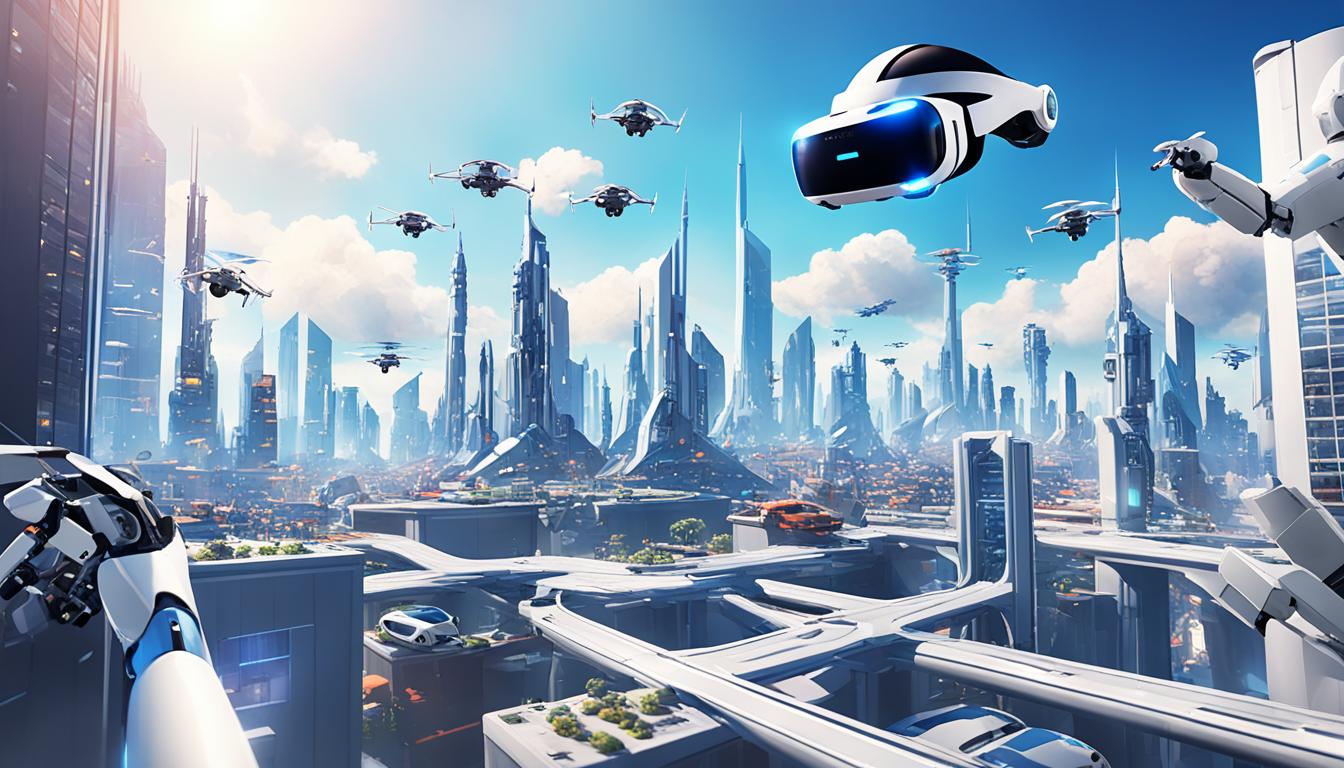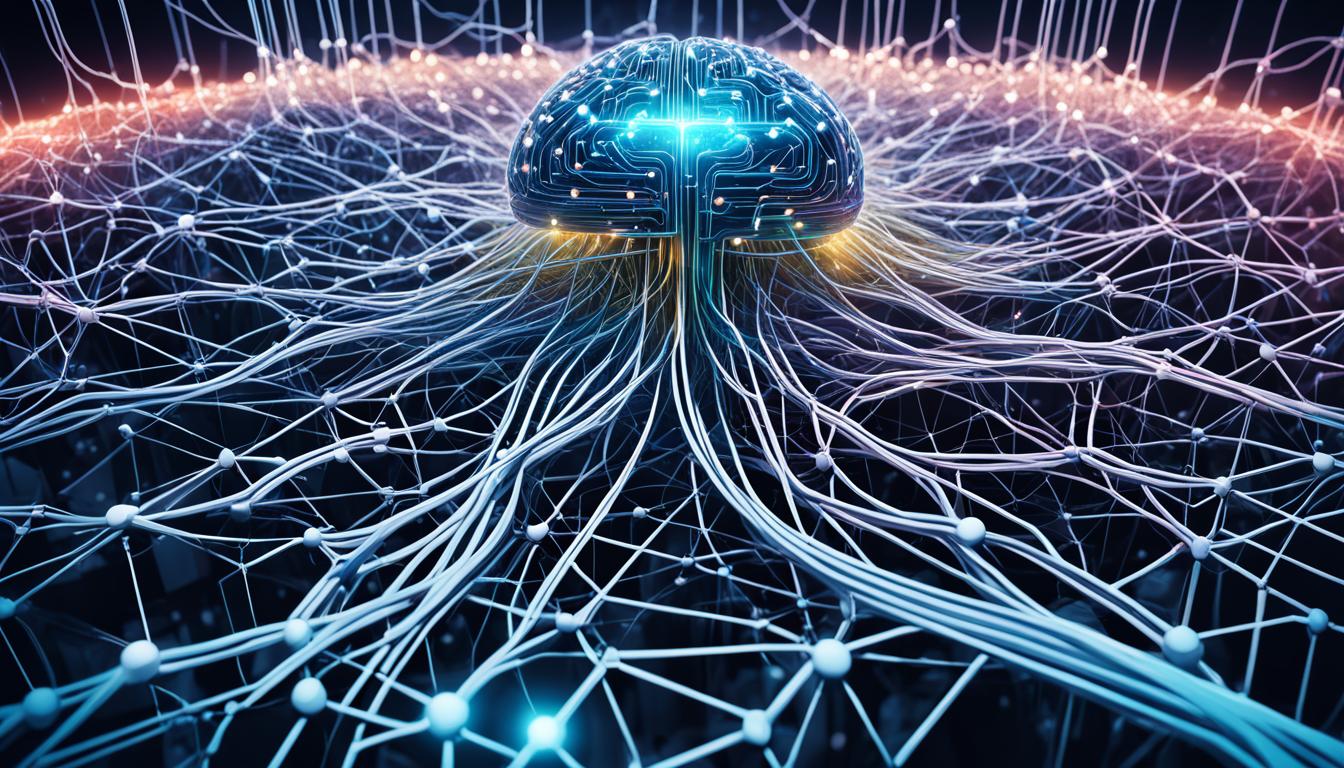
“The advance of technology is based on making it fit in so that you don’t really even notice it, so it’s part of everyday life.” – Bill Gates
We are at the edge of a fourth Industrial Revolution. This next phase is fueled by quick technological advancements. Our lives will change in ways we can’t yet imagine. Technologies in 2025 will shake up entire industries and change how we work. These future tech trends will combine, affecting many areas, and making big waves everywhere.
The coming years will see big growth in mobile internet, linking 4.3 billion more people. AI will make things work better. Disruptive technology like virtual and augmented reality will create new experiences worth $80 billion. Technologies like cloud, IoT, and better robotics will change how things are made and done, making them more efficient and creative.
Better security in biometrics could mean saying goodbye to usual passwords. 3D printing will make making products more personal, changing how we get things. Innovations in genes will boost farming and energy. Blockchain, besides cryptocurrencies, is finding new uses. Quantum computing might be ready for some business uses in about five years, according to Google.
By 2025, the skills needed in many jobs will change a lot. Nearly a third of these skills will be brand-new. It’s an exciting time, promising big changes and chances for growth.
Key Takeaways
- Mobile internet expected to connect 4.3 billion more people by 2025.
- AI is set to enhance productivity across various sectors.
- Virtual and augmented reality markets projected to grow significantly.
- Quantum computing is rapidly advancing with potential commercial applications within five years.
- Blockchain technology’s use cases are expanding beyond cryptocurrency.
Artificial Intelligence (AI) Revolution
Artificial Intelligence is changing how many industries work. More companies are using AI to make things easier, better decisions, and for happier customers. Technology giants like OpenAI, Google, and Microsoft are leading this change. They make powerful AI tools available for businesses of all sizes. This shift is transforming businesses worldwide.

Adoption Across Industries
In finance, AI helps make trading and managing risk better while spotting fraud. In healthcare, AI improves how we see images and helps make treatments for each person. Manufacturers use AI to predict when machines need fixing and to better their supply chains. Retailers use AI to understand customers and manage products better. AI is making these fields more efficient and creative.
AI in Daily Life
AI is now part of how we live, making things run smoother. Voice assistants like Amazon’s Alexa and Apple’s Siri have become common, helping with daily tasks. AI now writes news, ads, and even art. It is also in customer service, making help faster and more personal. The use of AI in daily life keeps growing.
The Democratization of AI
Big efforts by companies like OpenAI, Google, and Microsoft are making AI tools more available. Their work lets many people use advanced AI, not just companies. Tools like ChatGPT are making big steps in talking to computers like we talk to people. This “AI for all” approach is boosting the value AI brings to businesses and helping AI grow across different fields.
| Industry | AI Application | Benefits |
|---|---|---|
| Finance | Risk Management, Fraud Detection | Enhanced Security, Reduced Losses |
| Healthcare | Diagnostic Imaging, Personalized Treatment | Improved Accuracy, Better Patient Outcomes |
| Manufacturing | Predictive Maintenance, Supply Chain Optimization | Increased Efficiency, Cost Reduction |
| Retail | Customer Insights, Inventory Management | Improved Customer Experience, Optimized Stock Levels |
Quantum Computing
Quantum Computing is a game-changer. It can solve tough problems much faster than our current computers. This technology will make big improvements in problem-solving and how we handle data.
Potential Applications
Quantum Computing can do so much. It can tackle problems that we thought were too hard or took too long. For example, in healthcare, it boosts drug discovery accuracy and analysis of genes. Banks and other financial places hope to use it for cyber security and detecting fraud. Plus, it can help with predicting climate changes and making logistics smarter.
Current Research and Development
Work in quantum computing is moving fast. Lots of focus is on making data safer with quantum methods. Also, they’re getting better at finding new drugs accurately. In climate science, quantum tech is helping predict changes with more detail.
Commercial Availability
Quantum Computing is getting ready for the market. Places like Google’s Quantum AI Lab plan to have this tech available in five years. This will open new doors for businesses to grow, save money, and improve their tech. As quantum tech becomes more common, everyone will see its benefits.
| Sector | Potential Quantum Applications | Benefits |
|---|---|---|
| Healthcare | Drug Discovery, Genomic Analysis | Enhanced Accuracy, Speed |
| Finance | Risk Management, Fraud Detection | Optimized Solutions, Increased Security |
| Climate Science | Climate Simulations | Improved Predictive Accuracy |
| Logistics | Complex Optimization Problems | Efficient Solutions, Cost Reduction |
Blockchain Beyond Cryptocurrency
Initially, blockchain was closely linked to cryptocurrency. Now, it’s making its mark in many other areas. This Digital Ledger system is known for its clear, safe, and effective use. Its benefits extend beyond just digital money.
Decentralized Applications
DApps, or Decentralized Applications, are growing fast. They don’t need a central authority because they use the blockchain’s secure and transparent nature. DApps are changing how industries like finance and healthcare work. They make services better and safer from fraud.
Smart Contracts
Smart Contracts are key in blockchain. They automatically fulfill agreements when conditions are met, without a middleman. This makes legal and business deals smoother and clearer. The impact is felt in real estate, supply chains, and finance. Here, automated agreements cut costs and make things simpler.
| Blockchain Components | Key Benefits |
|---|---|
| Decentralized Applications | Enhanced Security, Transparency, Efficiency |
| Smart Contracts | Automated Agreements, Cost Reduction, Speed |
Internet of Things (IoT)
The Internet of Things (IoT) is growing fast, changing how our everyday devices work together. This change affects both our personal lives and industries. It’s known as *IoT Expansion* and brings big changes.
Expansion of Connected Devices
Today, we have around 9 billion connected devices. Soon, we’ll see 1 trillion of them. This rapid growth will improve how things work in many areas. For example, smart thermostats and industrial machines will work better, thanks to IoT.
IoT in Smart Cities
IoT is making cities smarter, too. By connecting devices, cities can better use resources and offer public services. IoT helps manage traffic and waste smarter. Thus, it makes urban life more sustainable and enjoyable.
Security and Privacy Concerns
But, as IoT grows, there are concerns about security and privacy. With more devices, it’s harder to keep data safe. Protecting IoT Networks is crucial for keeping personal data secure. To tackle these challenges, better security and privacy laws are essential.
| Category | Current Devices (Billions) | Projected Devices (Trillions) |
|---|---|---|
| Consumer Devices | 4.5 | 500 |
| Industrial Devices | 2.5 | 300 |
| Commercial Devices | 2 | 200 |
Advanced Robotics
Advanced robotics is ready to change how we connect with the world around us. It pulls together the best in AI, machine vision, sensors, and special materials. These machines will take on tasks like never before, making our work more precise in fields from healthcare to making things.
The need for skilled people in robotics is growing fast. Making, running, and keeping up with these smart machines takes special skills and a willingness to learn. Schools and programs are working to train up a workforce ready for the age of very smart robots.
Robots will do a lot in many fields, like making surgery easier and helping to build things better. They will also change the way some jobs work. So, learning new skills and being able to change with new tech is important. This is key as we look towards a future where robots do more but also work alongside people, and drive new ideas and efficiency in many areas.
FAQ
What are the top 10 emerging technologies to watch in 2025?
In 2025, key technologies include Artificial Intelligence, Quantum Computing, Blockchain, and more. These will change many industries and daily life in big ways.
How is artificial intelligence revolutionizing various industries?
AI is changing many fields by saving time and improving how things are done. For instance, finance uses AI to fight fraud, while health care relies on it for detecting illnesses.
How will AI affect daily life by 2025?
By 2025, AI will be common in our daily activities. Expect things like AI helping with customer service and creating online content automatically. Houses will get smarter too.
What does the democratization of AI mean?
The democratization of AI makes powerful tech available to more people. Companies like OpenAI and Google give tools for using AI, like ChatGPT, to everyone.
What are the potential applications of Quantum Computing?
Quantum Computing can change how we keep data secure, discover new drugs, and model the impact of climate change. It promises fast solutions to complex problems.
What are the current developments in quantum computing?
Quantum computing research is making steady progress. Companies are working hard to turn these theories into practical tools for everyone.
When will quantum computing be commercially available?
We could see small-scale quantum tech available for business use in about five years. Projects like Google’s Quantum AI Lab are pushing this forward.
How is blockchain technology evolving beyond cryptocurrency?
Blockchain tech has moved beyond money to change how we do legal, financial, or business tasks. It brings secure and automated processes through DApps and smart contracts.
What are decentralized applications (DApps)?
DApps are apps that don’t depend on a single server but a blockchain. They assure safety and honesty without a central authority. They can do tasks from finance to gaming.
What are smart contracts?
Smart contracts enforce agreements without middlemen, using code on a blockchain. They make deals safe, clear, and automatic.
How is the Internet of Things (IoT) expanding?
The IoT is quickly growing, with billions of new devices connecting every year. Soon, it will link everything, making our lives and work more efficient.
How does IoT contribute to smart cities?
Iot makes smart cities work better by linking services and resources. It helps save energy, improve services, and make life better for people.
What are the security and privacy concerns related to IoT?
The more the IoT grows, the more we worry about keeping data and devices safe. There’s a risk of cyberattacks and privacy issues. Strong security measures and constant checks on privacy are a must.
What advancements are being made in advanced robotics?
Robots are getting smarter thanks to AI, better vision, and advanced materials. They’re doing more tasks in different industries, making things faster and better.
How will advanced robotics impact employment?
As robots get more advanced, job roles will change. People will need to keep learning to work with these robots. While some jobs may be done by robots, new roles in maintaining and programming them will open up.
